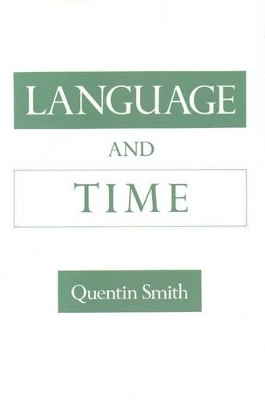
Language and Time
Seiten
2002
Oxford University Press Inc (Verlag)
978-0-19-515594-5 (ISBN)
Oxford University Press Inc (Verlag)
978-0-19-515594-5 (ISBN)
Quentin Smith offers arguments against the New Theory of Reference propounded by leading thinkers in the philosophy of language. He defends the tensed theory of time and argues that the simultaneity is absolute, basing this position on the theory that all propositions exist in time. He introduces an alternative interpretation of reference.
This book offers a defense of the tensed theory of time, a critique of the New Theory of Reference, and an argument that simultaneity is absolute. Although Smith rejects ordinary language philosophy, he shows how it is possible to argue from the nature of language to the nature of reality. Specifically, he argues that semantic properties of tensed sentences are best explained by the hypothesis that they ascribe to events temporal properties of futurity, presentness, or pastness and do not merely ascribe relations of earlier than or simultaneity. He criticizes the New Theory of Reference, which holds that "now" refers directly to a time and does not ascribe the property of presentness. Smith does not adopt the old or Fregean theory of reference but develops a third alternative, based on his detailed theory of de re and de dicto propositions and a theory of cognitive significance. He concludes the book with a lengthy critique of Einstein's theory of time. Smith offers a positive argument for absolute simultaneity based on his theory that all propositions exist in time. He shows how Einstein's relativist temporal concepts are reducible to a conjunction of absolutist temporal concepts and relativist nontemporal concepts of the observable behavior of light rays, rigid bodies, and the like.
This book offers a defense of the tensed theory of time, a critique of the New Theory of Reference, and an argument that simultaneity is absolute. Although Smith rejects ordinary language philosophy, he shows how it is possible to argue from the nature of language to the nature of reality. Specifically, he argues that semantic properties of tensed sentences are best explained by the hypothesis that they ascribe to events temporal properties of futurity, presentness, or pastness and do not merely ascribe relations of earlier than or simultaneity. He criticizes the New Theory of Reference, which holds that "now" refers directly to a time and does not ascribe the property of presentness. Smith does not adopt the old or Fregean theory of reference but develops a third alternative, based on his detailed theory of de re and de dicto propositions and a theory of cognitive significance. He concludes the book with a lengthy critique of Einstein's theory of time. Smith offers a positive argument for absolute simultaneity based on his theory that all propositions exist in time. He shows how Einstein's relativist temporal concepts are reducible to a conjunction of absolutist temporal concepts and relativist nontemporal concepts of the observable behavior of light rays, rigid bodies, and the like.
| Erscheint lt. Verlag | 29.8.2002 |
|---|---|
| Verlagsort | New York |
| Sprache | englisch |
| Maße | 231 x 152 mm |
| Gewicht | 397 g |
| Themenwelt | Geisteswissenschaften ► Philosophie ► Erkenntnistheorie / Wissenschaftstheorie |
| Geisteswissenschaften ► Philosophie ► Metaphysik / Ontologie | |
| Geisteswissenschaften ► Philosophie ► Sprachphilosophie | |
| Naturwissenschaften | |
| ISBN-10 | 0-19-515594-7 / 0195155947 |
| ISBN-13 | 978-0-19-515594-5 / 9780195155945 |
| Zustand | Neuware |
| Haben Sie eine Frage zum Produkt? |
Mehr entdecken
aus dem Bereich
aus dem Bereich
die Grundlegung der modernen Philosophie
Buch | Softcover (2023)
C.H.Beck (Verlag)
CHF 25,20
Buch | Softcover (2023)
Reclam, Philipp (Verlag)
CHF 9,80

![Was heißt Denken?. Vorlesung Wintersemester 1951/52. [Was bedeutet das alles?] - Martin Heidegger](/media/113619842)
